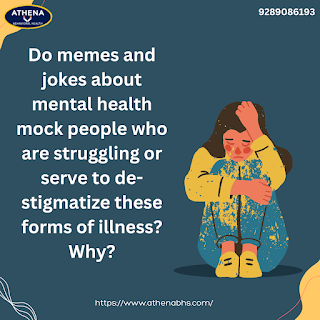People with mental illness face barriers because of public stigma. In the context of disclosure, humor may have the capacity to reduce stigmatizing attitudes but then memes or jokes about mental health in a derogatory manner won’t help much.
But does using memes as mockery to the mental
health concern help in some way at least? Well this can be a debate as
the mental health concerns are highly stigmatized and people don’t accept or
rather understand the concept until and unless one has gone through any issue
themselves or their loved ones.
There are memes for anything that may be categorized as
"mental health," including anxiety, depression, addiction, eating
disorders, poor therapy outcomes, medication withdrawal, inpatient treatment,
and more. As our collective understanding of mental health issues has grown,
informed by the potent diagnosis-based medical model, terms like
"triggering," "dissociating," "trauma,"
"intrusive thoughts," and "attachment theory" have
transcended clinical settings and entered common usage. This has been reflected
in memes over time.
According to one study, those who identify as depressed find
so-called "depression memes" to be funnier and more sympathetic than
others who do not. The memes could be unsettling to some individuals. This
disparity in perception might support the hypothesis that those who are skilled
at handling challenging emotional situations have a darker sense of humor.
Whether or not this is the case, the connection made by a like, a share, or a
retweet in a meme can be temporary. Social media platforms, omnipotent
capitalist institutions created to manipulate and profit from our emotional
responses, make this possible.
All generations share memes on mental health, but young
people are particularly fond of them.
There is a large market for people to stand up and provide
solutions because of the shortcomings of the mental health system and the
potent connecting tool of social media. It has been amazing to watch the rise
of life coaches and other "practitioners" who market their own brand
of therapy in recent years. We cannot deny the fact that this is a market, even
while those who join this arena do so with the best of intentions—to help
others. There is often a lot of money transacted.
Slick, shareable information on social media can certainly
promote individual healing, or whatever term we want to use, but it all depends
on the individual. It's difficult to argue against the possibility that random
bits and pieces can lead to thought-provoking discussions or provide unexpected
laughter. Even a momentary interaction counts as one.
How much self-awareness does scrolling away actually
produce? Who are we actually helping if we tag someone in an ADHD meme that
instructs us to tag ourselves if we relate to whatever is in the image, handing
out our data in the process? There needs to be a large, painful discourse about
the commodity of suffering.
Such mockery in the form of derogatory manner somewhere
increases the stigma altogether. Definitely, it's benefiting the person posting
the content to get the amount of engagement from the viewers but then it's not
benefiting the field altogether.
Athena Behavioral Health offers a wide range of specialized
services for the treatment of co-occurring disorders, including ADHD and
anxiety. Offering mental services, such as mental health counseling, drug
addiction recovery and healthcare management, Athena Behavioral Health provides
effective solutions to heal the mind and body. Call 9289086193 or drop
us an email at info@athenabhs.com
To know more about mental health visit : Best De
Addiction Centres in Delhi, Best Psychiatric center in Delhi
Gurgaon,





No comments:
Post a Comment
If you have any doughts. Please let me know